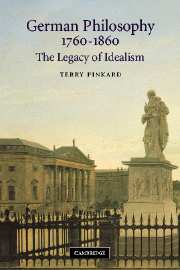Book contents
- Frontmatter
- Contents
- Acknowledgements
- List of abbreviations
- Introduction: “Germany” and German philosophy
- PART I KANT AND THE REVOLUTION IN PHILOSOPHY
- PART II THE REVOLUTION CONTINUED: POST-KANTIANS
- PART III THE REVOLUTION COMPLETED? HEGEL
- PART IV THE REVOLUTION IN QUESTION
- Introduction: exhaustion and resignation, 1830–1855
- 12 Schelling's attempt at restoration: idealism under review
- 13 Kantian paradoxes and modern despair: Schopenhauer and Kierkegaard
- Conclusion: the legacy of idealism
- Bibliography
- Index
13 - Kantian paradoxes and modern despair: Schopenhauer and Kierkegaard
Published online by Cambridge University Press: 05 June 2012
- Frontmatter
- Contents
- Acknowledgements
- List of abbreviations
- Introduction: “Germany” and German philosophy
- PART I KANT AND THE REVOLUTION IN PHILOSOPHY
- PART II THE REVOLUTION CONTINUED: POST-KANTIANS
- PART III THE REVOLUTION COMPLETED? HEGEL
- PART IV THE REVOLUTION IN QUESTION
- Introduction: exhaustion and resignation, 1830–1855
- 12 Schelling's attempt at restoration: idealism under review
- 13 Kantian paradoxes and modern despair: Schopenhauer and Kierkegaard
- Conclusion: the legacy of idealism
- Bibliography
- Index
Summary
SCHOPENHAUER'S POST-KANTIANISM IDEALISM AS ROMANTIC PESSIMISM
In almost all respects, Schopenhauer ought to be taken as a post-Hegelian philosopher, even though chronologically speaking, his major work, The World as Will and Representation, was published around the same time as Hegel's own Encyclopedia (1818 for the former, 1817 for the latter). However, only after the 1850s, almost twenty years after Hegel's death, was Schopenhauer's work recognized as possibly offering an alternative post-Kantian philosophy both to the kind that Fichte and Schelling had begun and that Hegel had seemingly completed, and to the kind of empirically oriented but nonetheless religiously sentimentalist post-Kantianism of Fries and his school.
Schopenhauer's own life overlapped that of the post-Napoleonic generation: he was born in 1788, and he died in 1860. Because his father was a wealthy businessman, Schopenhauer never wanted for money in his life, which, in turn, gave him the independence from academic life that allowed him to pursue his own, more idiosyncratic course despite the fact that German academia remained more or less totally unreceptive to Schopenhauer's work over the course of his career. In fact, it was not until late in his career that those outside of academia paid much attention to him; Heine, for example, does not even mention him in his books to the French on the state of philosophy in Germany.
- Type
- Chapter
- Information
- German Philosophy 1760–1860The Legacy of Idealism, pp. 333 - 355Publisher: Cambridge University PressPrint publication year: 2002

